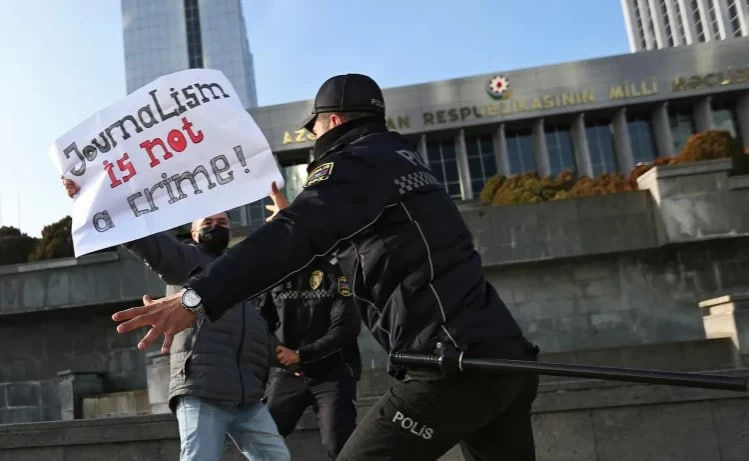Trial begins in Azerbaijan over Abzas Media case
Abzas Media case trial begins
Legal proceedings have begun in Azerbaijan over the Abzas Media case, with all those involved facing charges of smuggling and other economic crimes. The media figures on trial deny the accusations, linking their arrest to the corruption investigations they carried out.
- Opinion: Baku could become venue for Ukraine negotiations
- White House: new sanctions against those undermining democracy in Georgia coming in weeks
- Azerbaijan arrested three for plotting to seize a customs checkpoint and take hostages

On December 17, a preparatory hearing for the Abzas Media case took place at the Serious Crimes Court in Baku, presided over by Judge Rasim Sadikhov. Among the accused were Ulvi Hasanli, the director of the independent online publication Abzas Media, deputy director Mahammad Kekalov, editor-in-chief Sevinc Vagifgizi, reporters Nargiz Absalamova and Elnara Gasymova, investigative journalist Hafiz Babali, and economist Farid Mehraliev, who has no connection to the publication.
Journalists were not allowed into the courtroom on the grounds that “there was no space.” As noted by the journalists who were unable to attend the hearing, the room was already filled with people unrelated to the defendants.
“Family members of the arrested journalists struggled to get in, while colleagues who wanted to cover the trial were simply turned away, being told the room was already full,” said a JAMnews staff member who was also denied entry.
Both the lawyers and the defendants raised a motion in this regard.
“We filed motions on four or five issues. One motion was about the fact that journalists and family members of the defendants could not enter the courtroom. Ulvi pointed out that there were many people in the courtroom who had nothing to do with the case and asked the court to remove them to ensure that the defendants’ friends, family, and especially journalists, who should have covered the trial, could attend,” said Zibeyda Sadygova, Ulvi Hasanli’s lawyer.
According to the lawyer, the court rejected the motion for allowing journalists into the trial and filming the proceedings.

In other petitions, the defense asked the court to drop the criminal charges and transfer the arrested journalists to house arrest.
“The petition to dismiss the charges was not considered, and the petition for house arrest was rejected. Despite the fact that my client Nargiz and others have been in custody for over a year without any grounds,” said Rovshan Rahimli, the lawyer for Nargiz Absalamova.
According to her, only one petition from all the lawyers was granted: the defendants were allowed to leave the glass cage and sit next to their lawyers.
The trial on the merits is scheduled for December 28.
According to the relatives of the journalists, they have rejected all charges in court and remain in high spirits. Accused journalist Hafiz Babali urged Judge Rasim Sadykhov “not to carry out a political order and to consider the case objectively.”
Representatives from several Western embassies accredited in Baku were present at the hearing.
Abzas Media case
The criminal prosecution in the “Abzas Media” case began on November 20, 2023. On that day, the publication’s director, Ulvi Hasanly, and his deputy, Mahammad Kekalov, were detained. The following day, upon returning to the country, the chief editor, Sevinc Vagifgizi, was arrested at the airport.
Arrests in connection with the case continued until January 2024, when reporters Nargiz Absalamova and Elnara Gassymova, as well as investigative journalist Hafiz Babali, were detained.
On June 1, economist Farid Mehralizadeh was arrested in relation to the “Abzas Media” case. However, he denies any connection to the media outlet. Abzas Media also issued a statement asserting that they never collaborated with the arrested economist.
Initially, all the accused faced charges of smuggling. Later, they were also charged under seven more serious articles of Azerbaijan’s Criminal Code – 192.3.2 (illegal entrepreneurship with significant profit), 193-1.3.1 and 193-1.3.2 (money laundering by an organized group), 206.4 (smuggling by an organized gang), 320.1 and 320.2 (document forgery and the use of counterfeit documents), and 213.2.1 (group tax evasion).
For these charges, they face up to 12 years in prison, as opposed to the 8 years initially expected.
The journalists deny all charges and link their arrests to the corruption investigations published by Abzas Media.
According to human rights defenders, the independent outlet Abzas Media “faced repression due to its publication of corruption investigations involving high-ranking officials and their relatives.”



















